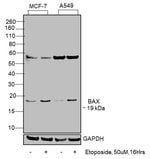Learn More
Invitrogen™ Bax Monoclonal Antibody (6A7), eBioscience™
Mouse Monoclonal Antibody
Supplier: Invitrogen™ 14699782
Description
Description: The 6A7 antibody reacts with mouse, rat, monkey and human Bax (20 kDa). The 6A7 antibody shows no cross-reaction with Bcl-2 or Bcl-xL proteins. Bcl-2, Bax, and Bcl-xL are members of a protein family that regulates apoptosis; while several family members including Bcl-2 and Bcl-xL inhibit apoptosis, overexpression of Bax promotes programmed cell death. A human Bax protein peptide sequence, aa 12-24, was used as immunogen. Applications Reported: The 6A7 antibody has been reported for use in immunoblotting (WB). Applications Tested: The 6A7 antibody has been tested by Western Blot and can be used at approximately 1 μg/mL. It is recommended that the reagent be carefully titrated for optimal performance in the assay of interest. Purity: Greater than 90%, as determined by SDS-PAGE. Aggregation: Less than 10%, as determined by HPLC. Filtration: 0.2 μm post-manufacturing filtered.
BAX is a members of the Bcl-2 Family and plays an important role in regulation of apoptosis. Whereas Bcl-2 is commonly regarded as an anti-apoptotic protein, BAX is considered to have a pro-apoptotic function. Regulation of apoptosis is supposed to involve both homo- and heterodimerization of different isoforms of BAX and Bcl-2. The Bax gene encodes different isoforms including Bax alpha (21 kDa) and Bax beta (24 kDa), whereas both isoforms contain the BH1, BH2 and BH3 domains, Bax beta has a unique carboxyl terminus and does not contain a hydrophobic transmembrane domain. Bcl-2 is also expressed in different Isoforms. Bcl-2 beta differs in the 3' UTR and coding region compared to variant alpha. Bcl-2 beta is shorter (22 kDa) and has a distinct C-terminus compared to Bcl-2 alpha (26 kDa). BAX is a member of the BCL-2 family of proteins, which function as regulators of apoptosis. Overexpression of BAX functions to promote cell death. BAX can form homodimers and is also able to heterodimerize with other BCL-2 related proteins.- Environmental benefits include:
- Renewable Energy
Specifications
| Bax | |
| Monoclonal | |
| 0.5 mg/mL | |
| PBS with 0.09% sodium azide; pH 7.2 | |
| Q07812, Q07813, Q63690 | |
| BAX | |
| Affinity chromatography | |
| RUO | |
| 12028, 24887, 581 | |
| 4°C | |
| Liquid |
| Western Blot | |
| 6A7 | |
| Unconjugated | |
| BAX | |
| apoptosis regulator BAX; Apoptosis regulator Bcl-X; Bax; Bax zeta; BAX-ALPHA; Bax-alpha protein; Baxdelta2G9; Baxdelta2G9omega; Baxdelta2omega; BCL2 associated X protein; BCL2 associated X, apoptosis regulator; BCL2 like 1; BCL2-associated protein; Bcl-2-associated protein Bax; Bcl2-associated protein Bax; Bcl-2-associated X protein; BCL2-associated X protein; BCL2-associated X protein omega; BCL2L; BCL2L1; Bcl2-L-1; BCL2L4; Bcl2-L-4; BCL2-like 1; bcl-2-like protein 1; Bcl-2-like protein 4; BCLX; Bcl-X; BCL-XL/S; PPP1R52; protein phosphatase 1, regulatory subunit 52 | |
| Mouse | |
| 100 μg | |
| Primary | |
| Human, Mouse, Rat, Monkey | |
| Antibody | |
| IgG1 |






